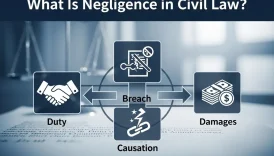What Is Legal Jurisprudence?

Legal jurisprudence is one of the most fundamental concepts in the study of law. It refers to the philosophy, theory, and science of law—how laws are created, interpreted, and applied. While statutes and regulations provide rules, jurisprudence explores the deeper reasoning behind those rules, offering insight into justice, fairness, and legal systems as a whole.
Simple Definition
Legal jurisprudence is the theoretical study of law, examining its principles, foundations, and methods of application. It is often described as the philosophy of law, concerned with understanding the nature of legal systems, the meaning of justice, and the role of courts and legislators.
Real-Life Examples
- Case law: Courts establish precedents that shape how laws are interpreted in future cases.
- Constitutional analysis: Jurisprudence guides debates about rights such as free speech or due process.
- Legal philosophy: Judges may use natural law theory or positivism when making decisions.
- Comparative law: Scholars analyze how jurisprudence differs across countries and cultures.
Importance of the Term
- Defines legal reasoning: Explains how and why judges reach their decisions.
- Shapes interpretation: Influences how statutes and constitutions are applied.
- Provides consistency: Promotes fairness and predictability in legal systems.
- Guides legal education: Forms the basis of academic study in law schools.
Branches of Jurisprudence
| Branch | Description |
|---|---|
| Analytical | Examines the logical structure of law and legal concepts. |
| Normative | Explores the moral and ethical foundations of law. |
| Comparative | Studies differences and similarities across legal systems. |
| Historical | Analyzes the evolution of laws over time. |
| Sociological | Focuses on how law interacts with society and social change. |
FAQ
1) Is jurisprudence the same as law?
No. Law refers to actual rules and statutes, while jurisprudence is the study and philosophy behind them.
2) Why is jurisprudence important for judges?
It provides the reasoning framework for interpreting unclear or conflicting laws.
3) How does jurisprudence differ between countries?
Different legal traditions (common law, civil law, religious law) shape unique approaches to jurisprudence.
4) Is jurisprudence only theoretical?
No. It directly influences how courts interpret and apply laws in real cases.
5) Who studies jurisprudence?
Judges, lawyers, scholars, and students of law use jurisprudence to understand the principles guiding legal systems.
Closing
Legal jurisprudence goes beyond written rules, delving into the philosophy and reasoning that shape the law. By examining its foundations and applications, jurisprudence ensures that legal systems evolve in line with justice, fairness, and social progress.






